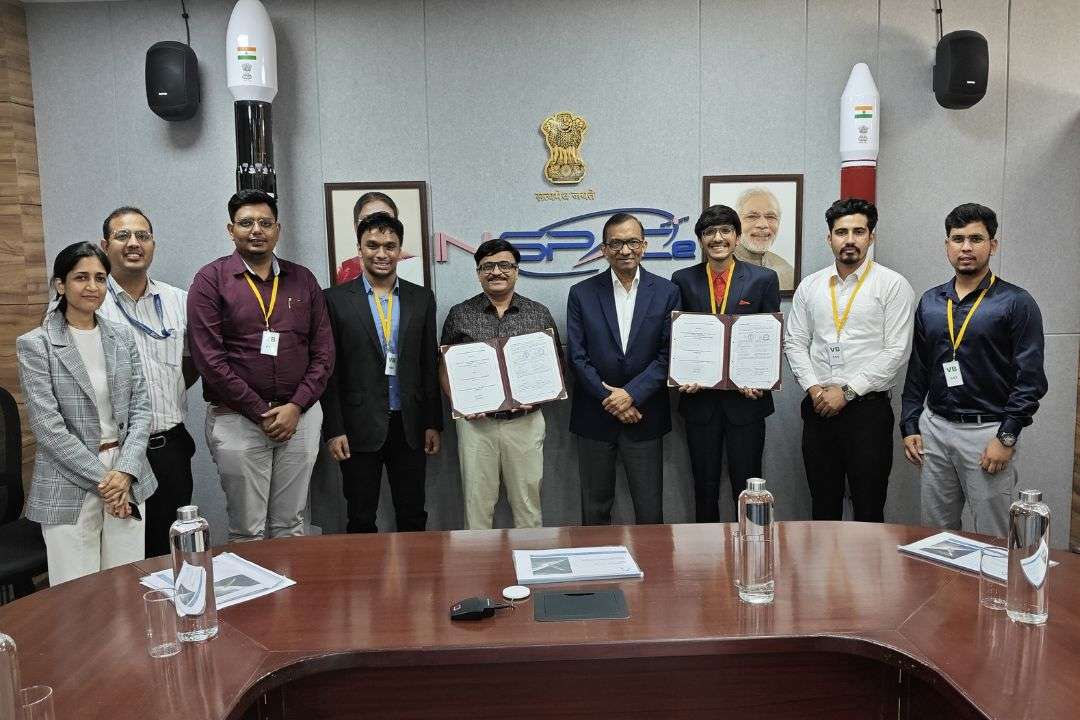Astrophel Aerospace, a private space technology company headquartered in Pune, has entered into a Memorandum of Understanding (MoU) with IN-SPACe (Indian National Space Promotion and Authorization Center), the nodal agency under the Department of Space (DoS) responsible for enabling private sector participation in India’s space ecosystem. Under the agreement, Astrophel Aerospace will receive access to select ISRO infrastructure, including test facilities and expert guidance, to support technical reviews, system-level testing, and qualification of critical components for its semi-cryogenic propulsion systems, such as turbopumps, engine modules, and cryogenic subsystems.
The partnership also includes collaboration through a Joint Project Implementation Plan (JPIP), allowing Astrophel to work directly with ISRO experts on design validation, project-specific evaluations, and testing campaigns. The MoU was formalized in the presence of Dr Pawan Goenka, Chairman of IN-SPACe, and Dr Prafulla Kumar Jain, Director of Program Management & Authorization, who oversees coordination between Indian private space firms and ISRO.
“This collaboration brings us closer to our goal of enabling cost-effective and reliable launch solutions across India,” said Suyash Bafna, Co-founder and CEO of Astrophel Aerospace.“Our focus goes beyond reusability—we’re building a robust domestic supply chain for cryogenic components, valves, and guidance systems with dual-use applications,” added Immanuel Louis, Co-founder of Astrophel Aerospace.
This partnership comes soon after Astrophel raised INR 6.84 crore in early-stage funding to support the development of its reusable launch hopper, which will be powered by the Astra-series launch vehicle. The company is currently preparing for an additional USD 5 million fundraising round aimed at accelerating engine development and scaling production of key components.
Astrophel’s propulsion systems are designed for dual-use, with cryogenic valves applicable in both space and clean energy sectors, including industrial gas systems, making the company a rising player in India’s wider aerospace and critical technologies landscape. Astrophel is among the few Indian startups to have successfully test-fired a semi-cryogenic engine, completing the test on 15 August 2023 with zero external capital.
The milestone was achieved with a total expenditure of just INR 6 lakh, demonstrating Astrophel’s cost-efficient approach and in-house engineering capabilities. With a compact, highly skilled team of engineers from ISRO, DRDO, and HAL, the company is now preparing for its first suborbital launch, and aims to deliver a fully functional, reusable hopper prototype within the next 24 to 36 months.
Founded with a vision to make space access more affordable and scalable, Astrophel Aerospace is developing dedicated launch vehicles for small satellite payloads. The company’s Astra C1 series and Potentia engine are powered by proprietary semi-cryogenic propulsion systems, placing Astrophel among the very few Indian firms to have built and tested this technology independently.
Using a combination of automotive-grade manufacturing principles and advanced 3D printing, Astrophel has achieved up to 40% reduction in cost and production time. Its product portfolio includes regenerative nozzles, throttleable valves, cryogenic subsystems, and real-time avionics software, all developed in-house.
Astrophel is preparing to launch orbital missions from Indian spaceports using reusable vehicles, with a focus on capturing opportunities in India’s rapidly expanding space economy—forecast to reach USD 44 billion by 2033. The company is backed by a seasoned advisory team, including propulsion experts with decades of experience from ISRO, HAL, and DRDO, providing strategic and technical direction to its long-term roadmap.








